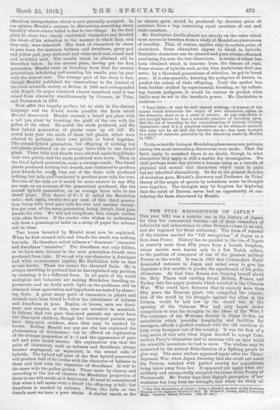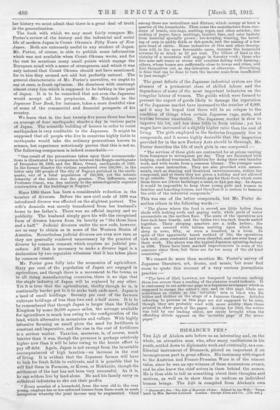THE FULL RECOGNITION OF JAFAN'..
THE year 1911 was a notable one in the history of Japan; for then her commercial treaties—all of them reminders of inferiority and subservience to other Powers—came to an end, • and she regained her fiscal autonomy. The form of ,renewal of the treaties marked the "full recognition" of Japan as .4 • first-class Power. History has no parallel to the rise of, Japan• in scarcely more than fifty years from a hermit'. kingdom, • whose secrets were known only to a few 'Dutch sailors,– to the position of conqueror of one of the greatest military Powers in the world. It was in 1853 that Commodore Peril demanded entrance to Japan and sitiled.away to give the Japanese a few months to ponder the significance of his polite ultimatum. At that time Russia was busying herself about the Holy Places and exciting Great Britain, Frame°, and Turkey into the angry protests which resulted in the Crimean- War. Who could have foreseen that in scarcely More than fifty years the Russian giant, who compelled 'the' admira, tion of the world by his struggle against the allies in the. Crimea, would be laid low by the dwarf who it Cho opening of the Crimean War had only begun under compulsion to turn his thoughts to the. ideas of the 'West 'a The existence of the Welcome Society in Japan to-day, an association which provides hospitality and facilities fOr strangers, affords a perfect contrast with the old ambition to keep every foreigner out of the country. It was the &St of a. long series of wise acts when Japan decided to. accept COM.- modore Perry's ultimatum and to exarainewith an open mind the scientific inventions he had to show. The wis.dom may be measured by the natural disinclination of a fighting people ta. give way. The same wisdom appeared again after the Chino Japanese War, when Japan, knowing that she could not resist' the Powers, watched with perfect suavity her acqUisiticins being taken away from her. It appeared yet again when she suddenly and unexpectedly accepted the terms of the Treaty of Portsmouth. Mr. Porter days that Japan's perception of her weakness has long been her strength, and when, we think on' • The. Pull Recognition of Japan : being a Detailed Acament the.li'cenentia. Program of the Japorkeee Buipire to TOXI. By Robert. P. Porter, .4v4t1i. Colour4
Napa. London : 1iehry Froerde. [IOn. ed. not.] ' " -
her history we must admit that there is a great deal of truth in the generalization.
The book with which we may moat fairly compare Mr.
Porter's review of the history and the industrial and social life of modern Japan is Count Okuma's Fifty Years of New Japan. Both are extremely useful to any student of Japan. Mr. Porter, of course, is able to publish some information which was not available when Count Okuma wrote, and for the rest he mentions many small points which engage the European mind with a sense of strangeness, and which it was only natural that Count Okuma should not have mentioned, for to him they seemed not odd but perfectly natural. The general characteristic of Mr. Porter's narrative, we ought to say at once, is frank optimism. He dismisses with contempt almost every lion which is supposed to be lurking in the path of Japan. It is to be remarked that not even the Japanese would accept all his prophecies. Mr. Takenob in the Japanese Year Book, for instance, takes a more doubtful view of some of the commercial and financial prospects of his country.
We learn that in the last twenty-five years there has been an average of four earthquake shocks a day in various parts of Japan. The scientific building of houses in order to resist earthquakes is very creditable to the Japanese. It might be supposed that all people who live in countries highly liable to earthquake would take the ordinary precautions known to science, but experience notoriously proves that this is not so. The following comparison is indeed remarkable :—
" One result'of the precautions taken upon their recommenda- tions is illustrated by a comparison between the Reggio earthquake of December 28, 1908, and the Mino, Owari, earthquake of 1891. In the former disaster the victims numbered over 100,000; in the latter only 190 people of the city of Nagoya perished in the earth- quake, out of a total population of 160,339, yet the seismic intensity of the latter was the greater. The difference, says Professor Omori, was duo entirely to the seismologically superior construction of ihe buildings in Nagoya."
• Since 1896 there has been a considerable reduction in the 'number of divorces. Before the new civil code of 1898 was introduced divorce was effected on the slightest pretext. The wife's domicile was merely transferred from her husband's .home to her father's. There was no official inquiry and no publicity. The husband simply gave his wife the recognized form of divorce known from its brevity as " the three lines and a half." Judicial divorces under the new code, however, are as easy to obtain as in some of the Western States of America. Nevertheless judicial divorces are even now rare, as they are generally rendered unnecessary by the practice of divorce by common consent, which requires no judicial pro- cedure. All that is necessary to make a divorce legal is a declaration by two reputable witnesses that it has taken place by common consent.
Mr. Porter goes fully into the economics of agriculture.
'Sixty per cent. of the population of Japan are engaged in agriculture, and though there is a movement to the towns, as in all rising manufacturing countries, there is no sign that the staple industry of Japan will be replaced by any other. Yet it is true that the agriculturist, thrifty though ho is, is continually harderput to it to make both ends meet. Japan is -a land of small holdings. Seventy per cent. of the farmers
'cultivate holdings of less than two and a-half acres. It is to be remembered that though Japan is larger than the United Kingdom by 'some 26,000 square miles, the acreage available for agriculture is 'much less owing to the configuration of the land, which alternates in mountains and valleys. With highly intensive farming on small plots the need for fertilizers is constant and imperative, and the rise in the cost of fertilizers is a seribus matter. Taxation, moreover, is, of course, much heavier than it was, though the pressure is perhaps relatively higher now than it will be later owing to the heroic effort to pay oftdebt. Again, Japan is not exempt from the invariable accompaniment of high taxation—an increase in the cost Of living. It is evident that the Japanese farmer will have to look for fresh fields to cultivate, and it is possible that lie will find them in Formosa, or Korea, or Hokkaido, though the settlement of the last has not been -very successful. As it is, lie can seldom live by land alone. He and his family carry on collateral industries to eke out their profits.
"Every member of a household, from the very old to the very young, employs his or her enforced leisure from farm-work in sonre occupation whereby the joint income may be augmented. Chief among these are sericulture and filature, which occupy at least a quarter of the households. Then come the manufacture from rice- straw of braids, rice-bags, matting, ropes, and other articles ; the making of paper, fancy wettings, bamboo fans, and osier baskets from material specially grown ; bee-keeping, weaving, the breed- ing of carp in paddy fields or fish-ponds, and the raising of a few poor head of cattle. Home industries of this and other descrip- tions will, in the more favourable cases, increase the household revenue by as much as 25 per cent. The tillers of land in the vicinity of a mountain will engage in forestry work ; those who live near salt water or rivers will combine fishing with farming ; others, whose homes are sufficiently close to towns and cities, will hire themselves out as day-labourers or otherwise. Everything is done that can be done to turn the income scale from insufficient to just enough."
The great defects of the Japanese industrial system are the absence of a permanent class of skilled labour and the dependence of some of the most important industries on the irregular labour of women. The guilds which were formed to prevent the export of goods likely to damage the reputation of the Japanese market have increased to the number of 6,000, and it may be hoped that there will be no relapse to the condition of things when certain Japanese rugs, mats, and textiles became unsaleable. The Japanese worker is slow to improve his lot, and has done little to form unions ; yet his wages have increased at a slightly higher ratio than the cost of living. The girls employed in the factories frequently live in
compounds, and it seems highly desirable that the inspection provided for in the new Factory Acts should be thorough. Mr. Porter describes the life of such girls in one compound :—
" The services of those girls are contracted for at prices varying from fourpence to sevenpeneo per day. They are furnished with lodging, medical treatment, facilities for doing their own laundry work, and with books from a common library. The younger ones receive some instruction. They are also provided with amuse- ments, such as dancing and theatrical entertainments, within the compound, and at times they are given a holiday and are allowed to go outside. They must, however, pay for their food, which costs them three sen (three farthings) a meal, or 21d. per day. In Japan it would be impossible to keep these young girls and women in families and boarding-houses, and therefore it is useless to bemoan the evils of the industrial compounds."
This was one of the better compounds, but Mr. Porter de- scribes others in the following words:-
" The places where the food is served are little better than sheds with leaking roofs and gaping walls, while pools of water accumulate on the earthen floor. The seats of the operatives are four-inch bare boards, and the tables two ten-inch boards nailed together. Their sleeping quarters are a trifle bettor; the floors are covered with tatima matting upon which they sleep in rows, fifty, or even a hundred, in a room. In spite of this apparently harsh method of life, the operatives look well, seem contented and even cheerful, and are ever busy at their work. The above was the typical Japanese spinning-factory in 1896. There have been marked improvements in some of the concerns since then, but there are far too many of the old kind remaining."
We cannot do more than mention Mr. Porter's survey of Japanese literature, art, drama, and music, but must find room to- quote this account of a very curious journalistic
practice :—
" The laws of libel, however, are tempered by customs making them less severe than a reading of the statutes would indicate. It is customary to set aside one page in a Japanese newspaper which is supposed to escape the editor's eye, and on this page libels are sometimes as visible as the ' invisible' men in black who flit hither and thither on the stage of a Japanese theatre. Articles referring to persons on this page are not supposed to bo seen, though they are probably read with more avidity than those printed in other parts of the paper. Actions for libel, the writer was told by one leading editor, are rarely brought when tho offending article appears on the 'invisible page' of the news- paper."







































 Previous page
Previous page